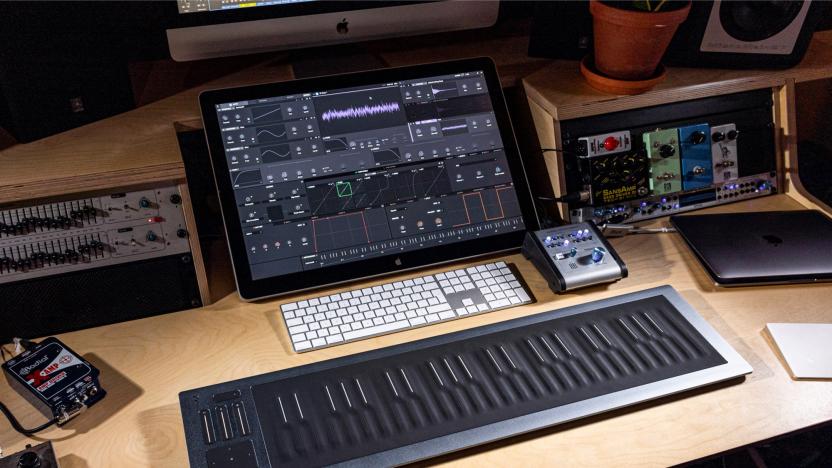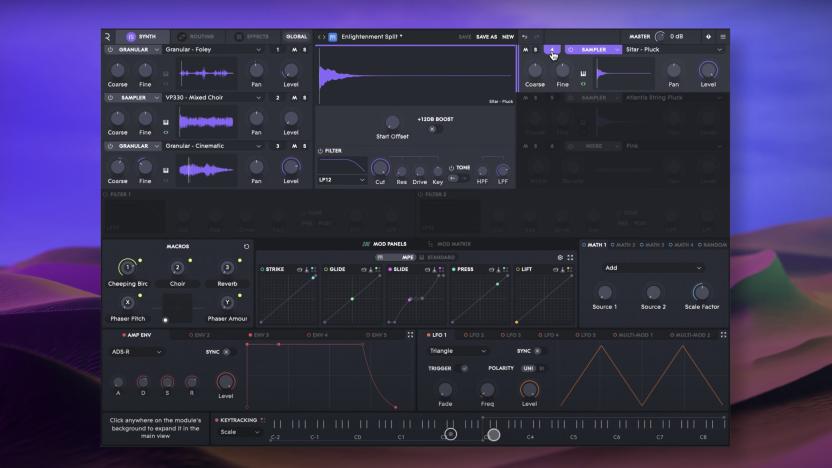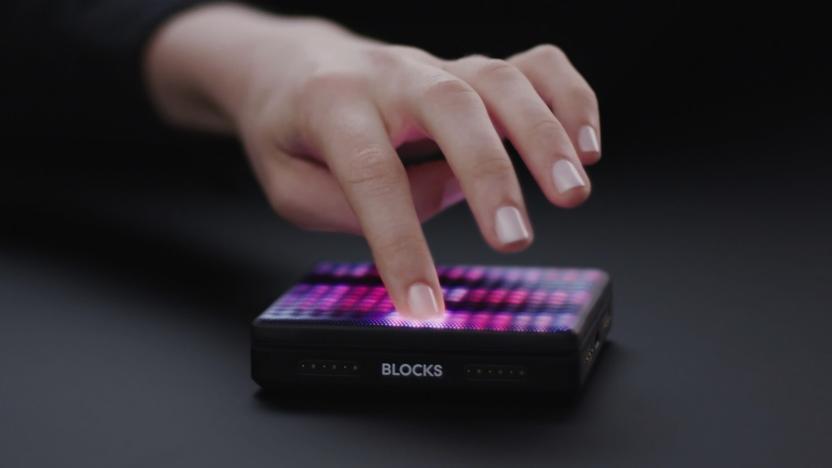Seaboard
Latest

Roli's redesigned Seaboard Rise keyboard offers more precise playing
Roli, the builder of unconventional musical instruments, has just announced the Seaboard Rise 2, a totally revamped version of its older Seaboard Rise keyboard. It's available for pre-order today.

Equator2 is the next step in Roli's vision for expressive digital music
Roli is best known as the creator of the Seaboard, an exceptionally expressive (and very mushy) take on the classic keyboard synth. "We're realizing the world's first true flagship MPE synth engine: Equator2," said Roli CEO Roland Lamb in a statement. For the uninitiated, "MPE" refers to "MIDI Polyphonic Expression" a specification jointly developed by a handful of companies including Roli, Apple, MOOG and more that allow for certain synths and instruments to send more detailed note data to sound generators like, well, Equator2.

Roli makes its Blocks music-making module more responsive
British music company Roli introduced an affordable, innovative music-making gadget last year called Roli Blocks. It's a set of modular synth controllers that can snap together and connect via Bluetooth to your iOS device. Roli is now updating the iOS app, Noise, and updating its surface controller, the Lightpad M.

Roli expands its modular music gear with the touch-friendly Seaboard
Last year, Roli launched an affordable, modular music creation system called Blocks. At launch, the company sold a square Lightpad block (intended for tapping out melodies and drum beats) and two smaller blocks that let you adjust a variety of settings or record and loop your music. Users can snap together as many Blocks as they want and hook them all up to an iPhone or iPad to create and record music. I spent some time playing with Blocks earlier this year, and while there's no doubt they're a fun and unique tool, the Lightpad's small size introduced some challenges when trying to create precise compositions. Roli's looking to fix that today by taking its flagship musical instrument, the Seaboard, and shrinking it down to Block size. The new $300 Seaboard Block is a small, two-octave version of its larger Seaboard instrument, but it retains all the unique touch-sensitive features you'll find in the bigger and more expensive versions. (The Seaboard Rise starts at $800, and Roli sells a variety of other sizes that range in price from $1,110 all the way up to over $8,000.)

'La La Land' composer on electronica's key role in the film
Damien Chazelle's La La Land might not have won that Oscar, but it did scoop up the one for Best Original Music Score. The man behind that score is Justin Hurwitz. Anyone who has seen the film will know that the soundtrack is largely divided between vintage Hollywood music and classic jazz -- the style favored by tortured musician Seb (Ryan Gosling). But for all of its antiquity, one of the biggest conflicts of the movie is Seb's struggle with pop success after joining his friend Keith (John Legend) in a band that fuses jazz flavors with modern electronic music. Hurwitz's challenge, then, was not only to score the movie but also to create a musical backdrop to Seb's journey of self-discovery, a journey that ultimately proves to be a crucial fork in the movie's twisting story.

Roli's quirky musical keyboard is now an iPhone app
When ROLI introduced the Seaboard -- a quirky interpretation of the musical keyboard -- it was hard not be curious. But, at $2,000, that's likely where you remained. Even the smaller, more affordable Seaboard Rise was a little out of reach for many casual musicians wanting to try its tactile trickery (watch this to see what we mean). Today, however, there's a ROLI for everyone, as the British firm has just announced Noise: a virtual Seaboard in iPhone app form. If you want to know why Apple's 3D Touch matters, it's apps like this that will show you -- and Noise is much easier on your pocket (in fact, it's free).

The Seaboard Rise is Roli's more affordable rubber-keyed piano
British startup Roli has launched a follow-up to its reimagined keyboard with a continuous, rubberized exterior: this one, however, is quite smaller and a lot more affordable. The Seaboard Rise was designed to be the more portable version of the company's Seaboard Grand instrument released a couple of years ago. It only has 25 keys -- Roli calls them "keywaves," because they do look like waves on a black surface -- whereas the smallest Grand iteration has 37. Thanks to that, though, it will only set you back $800, which sounds more reasonable than the cheapest Grand ($1,999), especially if you just want one for a home studio.

Roli Seaboard Grand up for pre-order, bendable music starts at $2,000
We were pretty impressed with what Roli showed off at SXSW back in March, and now the company's rubberized keyboard is up for pre-order. The instrument is built in a standard piano configuration, with a soft surface that allows you to directly bend pitch and add vibrato and other effects to the notes as you're playing them -- sort of like bending guitar strings. The Seaboard Grand comes in three price configurations that hit a pretty wide spread, starting at $2,000 for the 37-key Grand Studio, all the way up to $8,888.88 for the massive 88 key Grand Limited First Edition. Only 88 of the latter will actually be sold -- a vaguely superstitious pricing scheme, it seems. That one will be shipping in December of this year. The others will start arriving in fall of next year.

Roli's Seaboard is a rubber-keyed piano that may redefine the way you play
Synths are nothing new, of course -- so what makes Roli's digital piano so novel? The instrument has a patent-pending rubberized surface that lets you bend and twist the keys as you play, freeing you from fiddling around with knobs, so you can directly, physically affect the way it sounds. Think of it as the difference between bending a string on a guitar, rather than stepping on the wah-wah pedal. It's the sort of thing you really have to see in action to appreciate -- thankfully, we've got the instrument's creator Roland Lamb giving us a demo after the break.%Gallery-181387%

Chromium's experimental touch UI demoed on video, made for meaty fingers
Google was pretty adamant at I/O that Chrome OS would not be coming tablets, but that hasn't stopped its open-source cousin from adding some touch friendly features. Chromium (the browser, not the OS) got its first tablet tweaks back in June, but this is the first time we're seeing them on video. While the larger icons, widgets, and virtual keyboard, may eventually make their way onto the rumored Seaboard, there's no guarantee these (obviously still early) experiments will ever debut as part of Chrome OS or even the browser. Check out the video after the break for a brief glimpse of this work in progress and, if you're feeling adventurous, hit up the more coverage link to download the latest source code -- just make sure to compile with 'export GYP_DEFINES="touchui=1"' to unlock the finger-friendly face of Chromium.

Chrome OS machines leaked in bug reports: Acer netbook and touch-friendly Seaboard
Plowing through bug reports is a reliable way to dig up juicy morsels of info, and thanks to that timeless tactic we've got some specs on a pair of unannounced Chrome OS devices. First up is a netbook from Acer codenamed ZGB which, according to a recently filed report, will have a 1366 x 768 panel, presumably in the 10 to 12 inch range. We also know that you can hook up an external display to it via an HDMI port powered by an encoder chip from Chrontel. Since AMD's Fusion netbook platform supports HDMI natively, we can also safely assume that the ZGB will be running the web-only OS on an Atom processor. That's where the details end for now but, hey, it's better than nothing. The other device, Seaboard, has been floating around the Chrome OS flaw depot for some time, but reports are finally starting to reveal some tantalizing details. We now know that it is powered by a Tegra 2 and sports a touchscreen -- the perfect place to test out those finger-friendly tweaks we've heard so much about. There are also mentions of a "lid switch" and a physical keyboard, indicating it may be a convertible or something in the vein of the Eee Pad Slider rather than a pure slate. The hybrid form factor would make perfect sense since it will house a pair of USB ports and an HDMI jack, which could make for a rather chunky tablet. Obviously, neither of these devices are confirmed yet (and Seaboard is most likely being used for internal testing only) but at least we've got a better idea of what to expect when the browser-based OS comes to consumers later this year.






